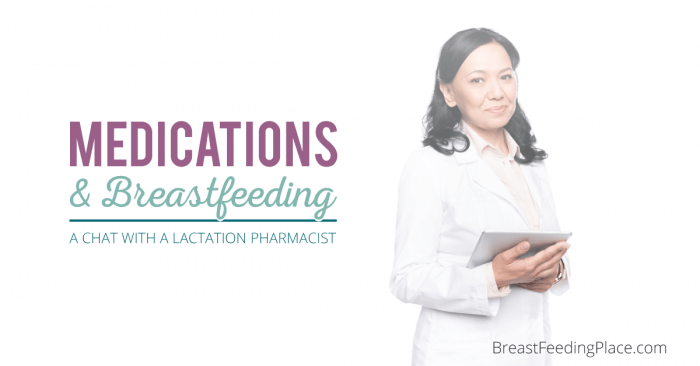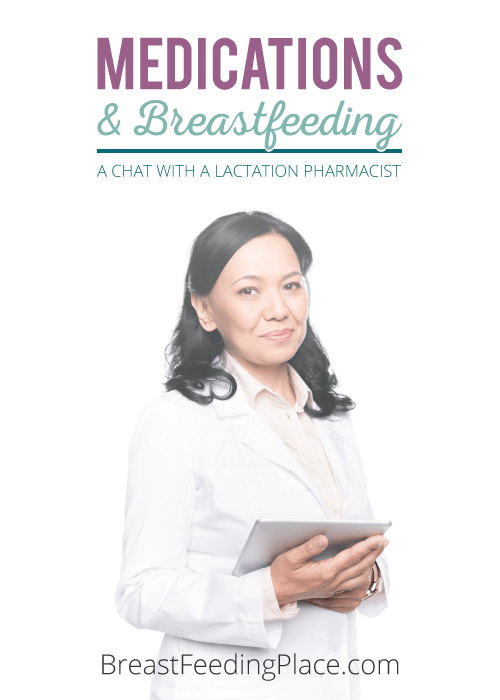Breastfeeding mamas are daily faced with the daunting task of figuring out how to care for their bodies without harming their nursing little ones. This task makes most medications seemingly off-limits, which can be frustrating. I had the chance to chat with Leslie Southard, a Lactation Pharmacist. Leslie is working to support nursing mothers by providing accurate information about medications and breastfeeding. She helps mamas find nursing-safe options to treat their illnesses.
This information is for informational purposes only and is not intended to treat or diagnose any illness or disease. Please talk to your doctor about your specific situation.

Leslie says, “A ‘Lactation Pharmacist’ is a pharmacist who specializes in treating and caring for lactating individuals. When I had my first daughter I was already a pharmacist. After she arrived, I realized how little training I had on medications and breastfeeding. I could tell you if a medication was safe for mom or baby but I couldn’t tell you if the medication would alter milk supply. The next two and a half years I spent learning as much as I could about lactation and reviewing the research available for medications and breastfeeding. I created the position “Lactation Pharmacist” because I truly feel lactating individuals need specialized care in regards to medications. I hope to develop this position fully, so other pharmacists are able to specialize in this area of medicine.”
“This is for many reasons. Most traditional healthcare references refer to information provided by the medication’s manufacturer. Most manufacturers do not test their medications in lactating individuals, so the recommendation is often to consider risk versus benefit. There are some great references for medications while breastfeeding that doctors, pharmacists, and the general public can utilize. LactMed is a free app with information about medications and their safety while breastfeeding. Infant Risk, a paid app and book, is another good resource.
Unfortunately, not all healthcare providers are aware of, or consult these resources before giving recommendations. Finally, it can be hard for someone to decide who to trust if multiple people are giving conflicting answers regarding a medication. All of these factors make it difficult to find reliable information.”
“There are a lot of factors that can contribute to a medication’s safety during pregnancy and then in lactation. Some medications can be dangerous to the growing baby or alter the amount of amniotic fluid. Other medications increase the risk of premature labor. These same medications may not have any effect on breast milk production or may not pose a risk to the baby once the baby is born. Ibuprofen is an example of a medication that should be avoided during pregnancy but is safe during lactation. It can alter the baby’s heart when used during pregnancy, but poses little to no risk once the baby is born.
The opposite is true as well. Some medications are safe during pregnancy but can decrease milk production or transfer to the baby and cause side effects. Sudafed is an example of a medication that is safe during pregnancy but can decrease milk production if used during lactation.

“Afrin nasal spray is a safe nasal decongestant for a mom who has sinus pressure or congestion. It can only be used for three days before taking a break, because it can cause rebound congestion related to the medication. Flonase or other nasal steroid sprays are also safe, but they can take several days to a week to fully work. If a mom has pain, such as a headache or sore throat, Tylenol and Ibuprofen are both safe. A mom can use dextromethorphan if she has a cough. Unfortunately, there is nothing to truly help with any nasal drainage, because the drainage is caused by the cold virus. Saline nasal sprays or rinses like NeliMed Sinus Rinses are safe and helpful in these situations. They clear out the drainage and thus the replicating cold virus.”
“Treatment for the flu will depend on the mom’s symptoms and how soon she presents with them. Tamiflu may be an option. It is the antiviral medication used for active flu. If a healthcare provider determines that she is eligible to take Tamiflu, it is safe to take while nursing. Very little of the medication transfers through the breast milk, and Tamiflu does not pose any concern for supply. If a mom decides not to take Tamiflu or is not eligible for Tamiflu, it is important to treat the symptoms. The same medications for colds may apply for the flu, depending on the mom’s symptoms.” (It is possible to treat the flu without Tamiflu or other drugs. Do your research, talk with your care provider and decide what is best for you and your baby.)
If you want to learn more about medications and breastfeeding, you can connect with Leslie through her facebook page, The Lactation Pharmacist, or visit her at www.thelactationpharmacist.com. Leslie also shared a hotline number to get information about specific medications and their use while lactating: 1-806-352-2519


